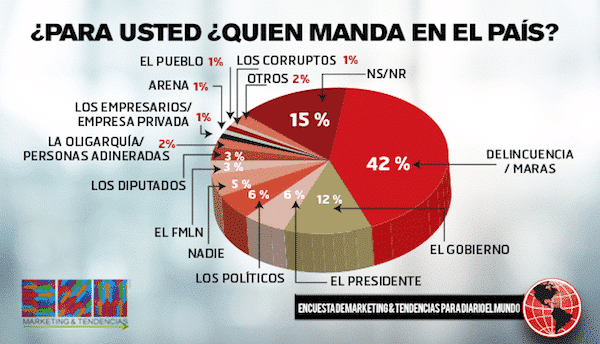Respondents to a recent survey in El Salvador were far more likely to believe that gangs — not government officials — “rule” the country, underscoring how the state’s failure to establish a legitimate presence in many areas has left them under the control of criminal organizations.
A survey of 1,000 Salvadorans conducted by El Mundo between October 28 and November 1 showed that 42 percent of respondents believe gangs rule the country.

(Credit: El Mundo)
On the other hand, the survey found that just 12 percent believe the government is in control. Six percent answered that President Salvador Sánchez Cerén holds power, and only 3 percent said the same about the governing Farabundo Martí National Liberation Front (Frente Farabundo Martí para la Liberación Nacional – FMLN) party.
SEE ALSO: El Salvador News and Profiles
Moreover, the survey found that 61 percent of Salvadorans believe that insecurity remains the country’s primary problem, and 81 percent believe that crime and insecurity have increased.
As for the factors responsible for worsening crime and insecurity, 45 percent of Salvadorans pointed to the “poor performance of the government,” while just 15 percent blamed the gangs and 6 percent blamed the National Police.
InSight Crime Analysis
For most of El Salvador’s gangs, including the MS13 and Barrio 18, controlling territory is a fundamental aspect of their criminal enterprises. In addition to obtaining and maintaining this control through violence, a recent InSight Crime investigation uncovered how gangs also infiltrate local governments to gain power. The El Mundo survey shows that this phenomenon has not gone unnoticed by Salvadorans, who tend to blame their government for not getting the gangs under control.
SEE ALSO: Special Investigation of Gangs and Municipal Power in Apopa, El Salvador
El Salvador Police Chief Howard Cotto recently warned that gangs are continuing efforts to infiltrate local politics ahead of the country’s March 2018 legislative and municipal elections. Cotto explained that gangs offer to secure votes for candidates or help bring down levels of violence in exchange for benefits such as reducing anti-gang security measures or providing jobs on the municipal payroll.

